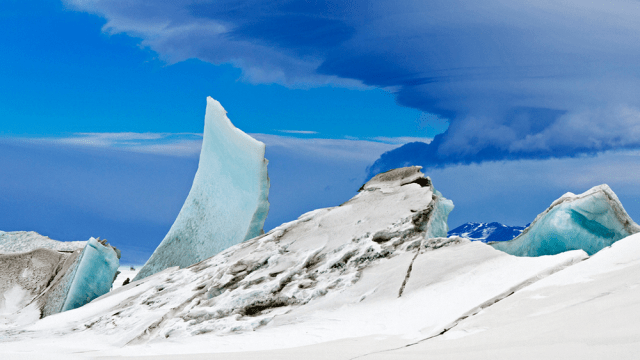If humans don’t stop burning fossil fuels soon, we’ll be paying for it for the next 10,000 years. That’s the conclusion of a perspective paper penned by nearly two dozen leading Earth scientists, which was published today in Nature Climate Change.
“The long-term view sends the chilling message [about] what the real risks and consequences are of the fossil fuel era,” Thomas Stocker, a climate scientist at the University of Bern and a co-author on the new report, said in a statement. “It will commit us to massive adaptation efforts so that for many, dislocation and migration becomes the only option.”
Earth scientists typically focus on 21st century climate change impacts when running models and communicating with policymakers. But according to the new report, focusing on such a narrow slice of geologic time has created a false public perception, “the impression that human-caused climate change is a twenty-first-century problem, and that post-2100 changes are of secondary importance, or may be reversed with emissions reductions at that time”.
To put our predicament in a broader context, the authors looked at the impact of four possible levels of carbon pollution — 1280 to 5120 billion tonnes — emitted between the year 2000 to 2300. (We’ve already put 580 billion tonnes of CO2 into the atmosphere, at a current rate of 10 billion tonnes per year.) Drawing on paleoclimate datasets that describe the relationship between carbon dioxide, temperature and sea level over the last 20,000 years, the researchers projected what will happen to global temperatures, sea level and ice cover over the next 10,000 years.
While each scenario has carbon emissions falling to zero by 2300, in all cases the impacts of industrial society last for up to 10,000 years. For instance, in the high-emissions scenario, global temperatures rise 7C by 2300 AD. By 12,300 AD, the planet has only cooled off a single degree.
One of the most disturbing aspects of the new report is the long-term march of sea level rise, which is likely to continue unchecked for thousands of years after carbon emissions fall to zero. “The amount of sea level rise was startling and chilling,” study co-author Peter Clarke of Oregon State University told Gizmodo in an email.
Last winter, NASA announced that Earth is probably locked into at least 90cm of sea level rise over the coming generations. But according to the new report, even an optimistic emissions scenario that limits global warming to 2C could ultimately cause global sea levels to rise by 25m. That’s a mind boggling amount of sea level rise — enough to drown Florida and most of the Eastern seaboard.
On the other end, under a high-emissions scenario, we melt Antarctica and sea levels rise over 61m over the long-term.
These figures, the authors note, exceed the Intergovernmental Panel on Climate Change’s sea level predictions by two to three orders of magnitude, “reflecting the inappropriateness of that timescale for addressing long-term responses”.
It might seem foolish to worry about the distant future when so many problems — war, poverty, disease, famine — demand our attention now. But over the long-run, climate change may be the single greatest threat to our survival, not least because it compounds most of the other threats we face. Unless we want to condemn many future generations to living in a harsher world, the authors say we need to end our dependence on fossil fuels immediately.
“To avoid the worst impacts [of climate change], we need to start decarbonizing now and get to zero or negative emissions as soon as possible,” Clarke said. “Reducing emissions alone is not enough.”
Top: Aerial image of Mount Discovery, located approximately 71km southwest of McMurdo station, Antaractica. Via NASA Goddard Spaceflight Cetner
